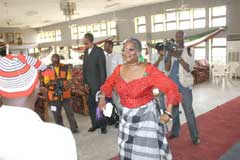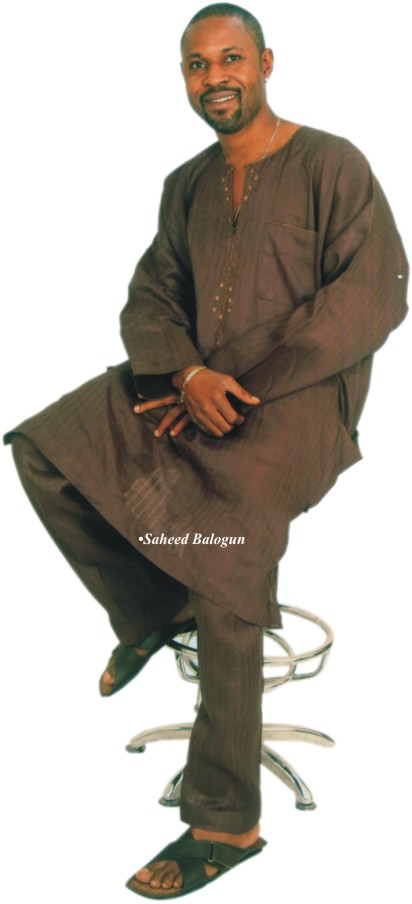
FORMER presidential aspirant and director, Lagos Business School, Prof. Pat Utomi, has described motion picture as serious business.
Utomi who was the special guest at the maiden edition of the Movie Reporters Guild of Nigeria, MORGON’s Nollywood Summit tagged Nollywood, Our Nollywood, last week at celebrity restaurant, O’jez, Lagos, discussed the topic entitled Nollywood and Business Opportunities.
He said the influential way of motion picture, makes it “a serious business.” He quoted Daniel Patrick who said, “The Central conservative truth is that culture, and not politics promotes progress”. He further stated that motion picture is at the heart of commercialization of culture, that is, packaging, distributing and consuming of culture in a manner that will influence. He however, advised on the encouragement of motion pictures because they reveal cultures. He advised that the industry should have a Private Film Fund to encourage the film industry in Nigeria; film villages with great sound studios to be provided so that the industry can create jobs both directly and indirectly; that government at all levels, particularly the state government should support the industry, either through finances, logistics or any other means, and also provide incentives to them; that people should be informed on what the industry is all about and their standards.
MORGON is an advocacy group determined to reposition Nollywood and move the industry forward for greater challenges and bigger prospects; that was the reason for an international summit. The Nigerian Film Corporation and its counterpart, the National Film and Video Censors Board were major backers of the Summit.
Speaking on Nollywood and Entertainment Journalists: A Partnership That Works, the National President of the Actors guild of Nigeria, AGN, Mr. Ejike Asiegbu went down memory lane as he revealed that Nollywood is all about entertainment and entertainment journalist are also there as partners, and this is why there is a partnership between them. But he pointed out that one of the reasons why some people don’t agree with the way journalists write, is because some of them don’t adhere to the ethics of the job. He therefore advised entertainment journalists to report activities of the sector, but not at the detriment of the practitioners.
Asiegbu called on writers to go softly on sensational stories, while dwelling more on investigative journalism, “so as to give everyone their due respects.”
No doubt, Nollywood faces a lot of challenges, according to the General Manager Odeon Cinemas, United Kingdom, Mr. Kene Mkparu, while speaking on Nollywood and the Cinema Industry. He stated that some of these challenges “are the sizes of films, the contents, the high prices of films, the distribution process, the mode of presentation, to mention but a few.” He explained that Nollywood films do not make use of celluloid and so the scale of their appeals are not in big screen, and as such do not meet global appeal.
Mkparu explained that efforts are being made to open cinema centers in December at Enugu, Ibadan, Port Harcourt, Kano, Markurdi, and The Palms in Lagos; “efforts are being made to get two screens at all cinema centers; efforts are also being made to get DVD projections. Efforts are also being made to get Hollywood and Nollywood together so they can learn from one another; efforts are also being made to showcase Nollywood movies at film festivals.
Still on the challenges faced by the industry, Mr. Adim Williams, the CEO of Ultimate Movie Academy, who spoke on the Dwindling Fortunes of Nollywood submitted that the fortunes of the industry have dwindled over the years. He named the perceived high rate of piracy as one of the “problems which had eaten deep into our society and to worsen the issue is that practitioners were ignorant of this act .So while they were struggling under the sun and rain to get the best movie to entertain viewers, the pirators were at the other end, reaping what they had not sown. The second point he mentioned is the video club regime. Here he revealed that a good number of Nigerians prefer to go rent films from video clubs rather than buy their own copies, and this has posed a lot of challenges to the industry, as producers no longer derive the actual amount they invested in making a movie, because most marketers deliberately planned to dominate the industry because they realized a huge amount of money was involved. Other challenges he feels facing the industry are the bastardization of the movie industry with witchcraft and cult movies, the ego tripping of the elite, the neglect of the government and its agencies, non professionals in the industry and finally, he feels the Nigerian movie industry is too young to have a strong regulatory framework and structure.
The Managing Director, Nigeria Film Corporation, Mr. Afolabi Adesanya, who was represented at the event by Dr. ‘Diran Ademiju-Bepo, Head, Industry Support Services, Nigerian Film Corporation while speaking on Government’s Good Intentions for Nollywood, explained that through the National Film Institute (NFI) there has been quality teaching and practical exposure on its intakes in Jos in diploma and other programmes. He therefore advised that there should be a systematic implementation of laid down procedures, and more importantly, the industry should see piracy as an economic crime. He said the founding fathers of the Nigeria movie industry have played their own part in getting the best for the industry, and so he urged the present and upcoming artists play their own parts in promoting the industry. “They should organize seminars, workshops, and summits for everyone’s opinion to be heard and finally the industry should be professionalized with ethical standards”, he concluded.
The Director General, National Film and Video Censors Board (NFVCB), Mr. Emeka Mba, who was represented by Mr. Njoku, spoke on the board’s efforts to regulate the distribution of films, so as to make profit and a good business, as well. “Before you distribute a film, you must be registered and qualified to gain access to the license, without which you can’t distribute”, he submitted. He explained that with the New Distribution Framework (NDF), copyrights will be minimized, piracy will be reduced to the barest minimum, will help industry attract fund from banks, will try to align with foreign investors, and the industry will be given a sense of belonging nationally and internationally.
In her own contribution, while speaking on Repositioning Nollywood Through Film Festivals and Awards, the CEO, Africa Movie Academy Awards (AMAA), Mrs. Peace Anyiam Osigwe Fiberesima, stated that film festivals would help Nollywood grow, because during the festivals, films are shown and open to criticism. “If it is good, people will praise it and if it is bad, people will criticize it,” she explained adding “to appreciate film festivals, it should be encouraged through supports.”
Awards, she said, can raise stakes and go a long way in encouraging practitioners to keep performing well. She emphasized that awards are given based on technicalities, production, the acting, and every other thing involved. She however encouraged the industry authorities to inform people concerning festivals whenever anyone is to come up and the venue for such festivals. She advised that Nollywood should speak with one voice, professionalize the profession so that they can be taken seriously both home and abroad.



















